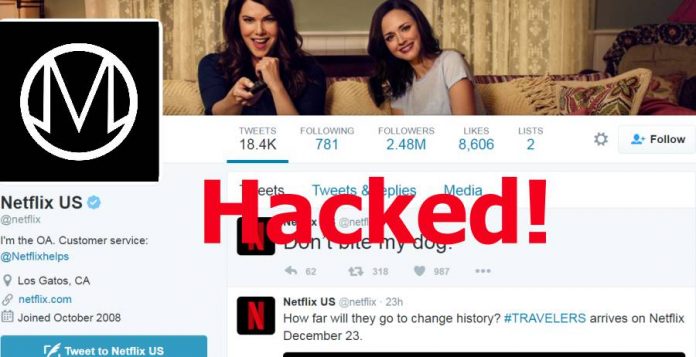
A white-hat hacker group called ‘OurMine‘ just claimed responsibility for a tweet published on Netflix’s official account that featured their logo and a short message inviting the streaming giant to get in touch with them. Netflix has not released a statement.
‘OurMine’ reportedly hacked into Netflix’s Twitter as an attempt to “test” their security, starting with the main tweet at 8:42 a.m. and following with two more updates. Netflix proceeded to delete all of their tweets not more than forty minutes later.
‘OurMine’ recently stated they were “trying to help the world security” and “trying to upgrade people’s security.” They have a history of high-profile hacking, including Mark Zuckerberg’s Twitter and Pinterest, and Sundar Pichai’s (Microsoft’s CEO) Quora account.

OurMine: No one is safe from hackers
White-hat hacking is the practice of breaching a computer or user account’s security for benevolent purposes, such as exposing its safety flaws for other people to fix them. The term is the opposite of black-hat (criminal) hacking.
‘OurMine’ has even hacked the official account of Twitter’s co-founder Jack Dorsey. In early October, BuzzFeed published an article claiming that a Saudi Arabian student by the name of Ahmad Makki was a member of ‘OurMine.’ The group denied it and later proceeded to hack the online magazine, altering many of its headlines.
The team has reiterated in recent interviews their commitment to raising awareness towards the dangers of the internet. They also offer cyber security services, and white hacking is one of their flashiest advertising tools.
Their official website offers four distinctive ‘scanning’ services aimed at finding any vulnerabilities within a client’s website, personal account (or accounts), or business network.
White Hat hacking is becoming popular
Though black-hat breaches and ransomware are responsible for making the most headlines in 2016, benevolent hacking has made it to the headlines many times in 2016.
For example, many saw the San Francisco light-rail hack as a white-hat move, given the hack made the subway service free for users.
Many online sources also regard the ‘No More Ransom’ initiative as a white-hat effort, given the group includes companies like Emisoft, Check Point, and BitDefender, who work to create user-friendly decryption tools that aid with bypassing and deleting malware.
The year of hackers: 2016’s largest security breaches
This year saw an increase and large-scale, high-profile online breaches. Below are the most important and most publicized of them.
- SWIFT hack, April-May, perpetrators unknown. Continuous security breaches on the Society for Worldwide Interbank Financial Telecommunications (SWIFT) transaction platform, total losses are still not entirely clear.
- BitCoin breach, August, perpetrator unknown. Hackers stole more than $65 million in cryptocurrency.
- Yahoo leak, September, perpetrator unknown. More than 500 million user accounts had their passwords revealed, arguably the biggest user data breach in history.
- Dyn DDoS attack, October, Anonymous (self-claimed). The group managed to shut down millions of accounts from social media services in the US and Europe.
- DNC hack, November, alleged Russian hackers. The perpetrators broke into a computer network used by the Hillary Clinton presidential campaign, published 20,000 emails.
Source: CNET










